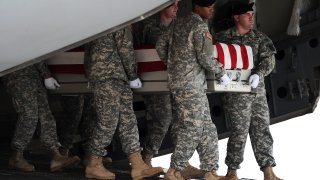
- If we don't try to turn this catastrophe around, it could be a disaster for America's image worldwide, writes former CIA officer A.J. Fuentes Twombly.
I served undercover for the CIA during the early years of the U.S. war in Afghanistan. My job was complex and intricate, but I forged a connection to the Afghans I worked with. These were people who risked their lives to fight the organized, systematic oppression conducted by the Taliban.
They did it to further the American idea of democracy and a belief that the U.S. government would help them succeed.
Although the peace that followed was always shaky, I watched small victories with pride. Since the start of the war, the infant mortality rate dropped by 50%, and millions more Afghan girls went to school. Over the last 15 years, Afghan women served in local and national government, and gardens returned to Kabul after years of drought.
We're making it easier for you to find stories that matter with our new newsletter — The 4Front. Sign up here and get news that is important for you to your inbox.
I am the daughter of Cuban refugees and am personally familiar with the generational trauma faced by families like mine, who were forced to flee their countries. As I watched the Taliban retake Afghanistan and wipe away 20 years of progress, I felt an acute grief for the people caught in the midst of an international chess game.
I am a lifelong Democrat. Following my service, I joined the Truman National Security Project, a left-leaning think tank made up of former civil servants and veterans who seek to have a say in international policy decisions based on our ground-level knowledge of conflict. My colleague and Truman Project President Jenny Ben-Yehuda said of the bitter end to America's longest war: "I wanted a withdrawal from Afghanistan, not an abandonment."
Tactically, there is now very little the U.S. can do to re-stabilize the country. With no U.S. Embassy or in-country resources, getting re-established would be an undertaking so costly it would defy almost any practical or political calculation. There are other options, but they pale in comparison to the stability Afghans had before this past weekend.
Money Report
Morally, the gut-wrenching scenes we have all seen speak for themselves. The deal secured by the Trump administration in February 2020 set up a disastrous end to this war. That administration was so convinced their efforts would pay off politically for then-President Donald Trump in his 2020 reelection bid, that they even briefly planned – then cancelled – a meeting with the Taliban at Camp David in 2019.
Ultimately, the "peace" deal was signed between the U.S. government and the Taliban, but did not include signatories from the now-overrun Afghan government. Biden and his administration may own the last few days, but the devastating withdrawal was set in motion by the last administration, which neither understood foreign affairs nor cared about the lives of people who would be caught in the middle.
According to the United Nations, 80% of the refugees forced to flee since May are women and children. I have witnessed firsthand the brutality that our allies on the ground will face. An Afghanistan controlled by the Taliban will slide back 20 years and erode the sacrifice of so many, including Afghans, Americans and our NATO allies.
And if the humanitarian crisis alone is insufficient to motivate action, then we should think about the security and economic costs of abandoning Afghanistan.
First, the message we risk sending our allies, once again, is that we will leave them behind. In October of 2019, the Trump administration unceremoniously abandoned the Kurds in Syria. Now we have abandoned the Afghans. This plays into the hands of China and Russia, who will be emboldened by the way the United States left Afghanistan.
Fear of U.S. military intervention has helped deter Chinese aggression against Taiwan, but our Afghan exit calls this long-held belief into question. Russia will be equally emboldened by what they will characterize as a weakened U.S. standing in the world, where our disposable peace came at the cost of $2 trillion spent and thousands of dead. China and Russia will rush to fill any void left in our departure, as will Iran.
The cost of an extended war, Biden argued, was not worth it. However, we cannot quantify the further cost of a Taliban government – in human lives, in dollars spent on defense, in years, in potential terrorist attacks against the United States. It will end up costing us more than an orderly withdrawal ever would have.
The Biden administration should immediately work to ensure safe passage out of Afghanistan for all our allies on the ground. This should include expedited visa processing for all eligible Afghans and should also include asking Afghanistan's neighbors to open their borders to refugees.
The administration should also work with the United Nations and the international community to ensure we set up the proper mechanisms and infrastructure to deliver the necessary humanitarian assistance to the people of Afghanistan.
If we don't try to turn this catastrophe around, it could be a disaster for America's image worldwide. It would certainly haunt the Biden administration. We can still show the world that we are willing and able to do the right thing.
A.J. Fuentes Twombly is a former CIA officer. She also teaches at NYU Stern School of Business and the Kenan-Flagler Business School at UNC Chapel Hill. She is a member of the Truman National Security Project Defense Council and is a member of the Cultural Vistas national board of directors and the Hispanic Heritage Foundation national board of directors.






